Pasko Rogulj: Austro-Hungarian Prisoner of Japanese, item 21
Transcription
Transcription history
-
On top outside the page
BY ... DATE March 15, 1962
On page
-2-
extremely close to each other on an elevated platform in the privates'
quarters which runs along each side of the building; in the middle
of the building instead of a wooden floor is a gravel walk, where the
tables for eating and worki
gng purposes are placed.The men all seemed sufficiently clothed; I was informed that
they had all brought with them at least two pairs of boots and twoosuits
of heavy clothing from Tsingtao; for the hot months the Government
provides the en with lighter wear. Each private has six blankets,
and the buildings where the men live are all during daytime well warmed.
The officers all purchase their own food. The other prisoners
have generally tea and bread in the morning, fish or meat or soup, with
vegetables or potatoes at noon, and meat with tea and bread at night.
Most of the prisoners seemed in good physical condition, and the health
of the camp has continued good since its removal to Aonagahara, At
the time of my visit the camp hospital ward, which is well fitted out,
contained three men, one of whom was gravelly ill with kidney trouble,
the other two having minor complaints.
On my round of the camp, I visited first the officers' quarters.
Major Drachenthal told me after a few words that if I would ask to speak
with Petty-Officer Hennig, I couldobtain from him a comprehensive list
of the men's complaints. When I did meet Pet-Officer Hennig he handed
me a typewritten list of complaints, which I asked permission of the
Commander to take with me. This he agreed to do if I would give him
time to have a translation of thelist made. The Commander seemed much
annoyed by the incident, and said he had no idea that there was any
ground for complaints.
When he had looked the list of complaints over, the Commander
told me that so far as the complaints about the striking of prisoners
were concerned, they were ridiculously exaggerated: that at no time
had a prisoner been struck by a guard, but had only at most been given
a slight push. The other complaints were largely admitted to be correct
-
On top outside the page
BY ... DATE March 15, 1962
On page
-2-
extremely close to each other on an elevated platform in the privates'
quarters which runs along each side of the building; in the middle
of the building instead of a wooden floor is a gravel walk, where the
tables for eating and workigg purposes are placed.
The men all seemed sufficiently clothed; I was informed that
they had all brought with them at least two pairs of boots and twoosuits
of heavy clothing from Tsingtao; for the hot months the Government
provides the en with lighter wear. Each private has six blankets,
and the buildings where the men live are all during daytime well warmed.
The officers all purchase their own food. The other prisoners
have generally tea and bread in the morning, fish or meat or soup, with
vegetables or potatoes at noon, and meat with tea and bread at night.
Most of the prisoners seemed in good physical condition, and the health
of the camp has continued good since its removal to Aonagahara, At
the time of my visit the camp hospital ward, which is well fitted out,
contained three men, one of whom was gravelly ill with kidney trouble,
the other two having minor complaints.
On my round of the camp, I visited first the officers' quarters.
Major Drachenthal told me after a few words that if I would ask to speak
with Petty-Officer Hennig, I couldobtain from him a comprehensive list
of the men's complaints. When I did meet Pet-Officer Hennig he handed
me a typewritten list of complaints, which I asked permission of the
Commander to take with me. This he agreed to do if I would give him
time to have a translation of thelist made. The Commander seemed much
annoyed by the incident, and said he had no idea that there was any
ground for complaints.
When he had looked the list of complaints over, the Commander
told me that so far as the complaints about the striking of prisoners
were concerned, they were ridiculously exaggerated: that at no time
had a prisoner been struck by a guard, but had only at most been given
a slight push. The other complaints were largely admitted to be correct
-
On top outside the page
BY ... DATE March 15, 1962
On page
-2-
extremely close to each other on an elevated platform in the privates'
quarters which runs along each side of the building; in the middle
of the building instead of a wooden floor is a gravel walk, where the
tables for eating and workigg purposes are placed.
The men all seemed sufficiently clothed; I was informed that
they had all brought with them at least two pairs of boots and twoosuits
of heavy clothing from Tsingtao; for the hot months the Government
provides the en with lighter wear. Each private has six blankets,
and the buildings where the men live are all during daytime well warmed.
The officers all purchase their own food. The other prisoners
have generally tea and bread in the morning, fish or meat or soup, with
vegetables or potatoes at noon, and meat with tea and bread at night.
Most of the prisoners seemed in good physical condition, and the health
of the camp has continued good since its removal to Aonagahara, At
the time of my visit the camp hospital ward, which is well fitted out,
contained three men, one of whom was gravelly ill with kidney trouble,
the other two having minor complaints.
On my round of the camp, I visited first the officers' quarters.
Major Drachenthal told me after a few words that if I would ask to speak
with Petty-Officer Hennig, I couldobtain from him a comprehensive list
of the men's complaints. When I did meet Pet-Officer Hennig he handed
me a typewritten list of complaints, which I asked permission of the
Commander to take with me. This he agreed to do if I would give him
time to have a translation of thelist made. The Commander seemed much
annoyed by the incident, and said he had no idea that there was any
ground for complaints.
-
On top outside the page
BY ... DATE March 15, 1962
On page
-2-
extremely close to each other on an elevated platform in the privates'
quarters which runs along each side of the building; in the middle
of the building instead of a wooden floor is a gravel walk, where the
tables for eating and workigg purposes are placed.
The men all seemed sufficiently clothed; I was informed that
they had all brought with them at least two pairs of boots and twoosuits
of heavy clothing from Tsingtao; for the hot months the Government
provides the en with lighter wear. Each private has six blankets,
and the buildings where the men live are all during daytime well warmed.
The officers all purchase their own food. The other prisoners
have generally tea and bread in the morning, fish or meat or soup, with
vegetables or potatoes at noon, and meat with tea and bread at night.
Most of the prisoners seemed in good physical condition, and the health
of the camp has continued good since its removal to Aonagahara, At
the time of my visit the camp hospital ward, which is well fitted out,
contained three men, one of whom was gravelly ill with kidney trouble,
the other two having minor complaints.
On my round of the camp, I visited first the officers' quarters.
Major Drachenthal told me after a few words that if I would ask to speak
with Petty-Officer Hennig, I couldobtain from him a comprehensive list
of the men's complaints. When I did meet Pet-Officer Hennig he handed
me a typewritten list of complaints, which I asked permission of the
Commander to take with me. This he agreed to do if I would give him
time to have a translation of thelist made. The Commander seemed much
annoyed by the incident, and said he had no idea that there was any
-
On top outside the page
BY ... DATE March 15, 1962
On page
-2-
extremely close to each other on an elevated platform in the privates'
quarters which runs along each side of the building; in the middle
of the building instead of a wooden floor is a gravel walk, where the
tables for eating and workigg purposes are placed.
The men all seemed sufficiently clothed; I was informed that
they had all brought with them at least two pairs of boots and twoosuits
of heavy clothing from Tsingtao; for the hot months the Government
provides the en with lighter wear. Each private has six blankets,
and the buildings where the men live are all during daytime well warmed.
The officers all purchase their own food. The other prisoners
have generally tea and bread in the morning, fish or meat or soup, with
vegetables or potatoes at noon, and meat with tea and bread at night.
Most of the prisoners seemed in good physical condition, and the health
of the camp has continued good since its removal to Aonagahara, At
the time of my visit the camp hospital ward, which is well fitted out,
contained three men, one of whom was gravelly ill with kidney trouble,
the other two having minor complaints.
On my round of the camp, I visited first the officers' quarters.
Major Drachenthal told me after a few words that if I would ask to speak
with Petty-Officer Hennig, I couldobtain from him a comprehensive list
of the men's complaints. When I did meet Pet-Officer Hennig he handed
me a typewritten list of complaints, which I asked permission of the
Commander to take with me. This he agreed to do if I would give him
time to have a translation of thelist made. The Commander seemed much
-
On top outside the page
BY ... DATE March 15, 1962
On page
-2-
extremely close to each other on an elevated platform in the privates'
quarters which runs along each side of the building; in the middle
of the building instead of a wooden floor is a gravel walk, where the
tables for eating and workigg purposes are placed.
The men all seemed sufficiently clothed; I was informed that
they had all brought with them at least two pairs of boots and twoosuits
of heavy clothing from Tsingtao; for the hot months the Government
provides the en with lighter wear. Each private has six blankets,
and the buildings where the men live are all during daytime well warmed.
The officers all purchase their own food. The other prisoners
have generally tea and bread in the morning, fish or meat or soup, with
vegetables or potatoes at noon, and meat with tea and bread at night.
Most of the prisoners seemed in good physical condition, and the health
of the camp has continued good since its removal to Aonagahara, At
the time of my visit the camp hospital ward, which is well fitted out,
contained three men, one of whom was gravelly ill with kidney trouble,
the other two having minor complaints.
On my round of the camp, I visited first the officers' quarters.
Major Drachenthal told me after a few words that if I would ask to speak
with Petty-Officer Hennig, I couldobtain from him a comprehensive list
of the men's complaints. When I did meet Pet-Officer Hennig he handed
me a typewritten list of complaints, which I asked permission of the
Commander
-
On top outside the page
BY ... DATE March 15, 1962
On page
-2-
extremely close to each other on an elevated platform in the privates'
quarters which runs along each side of the building; in the middle
of the building instead of a wooden floor is a gravel walk, where the
tables for eating and workigg purposes are placed.
The men all seemed sufficiently clothed; I was informed that
they had all brought with them at least two pairs of boots and twoosuits
of heavy clothing from Tsingtao; for the hot months the Government
provides the en with lighter wear. Each private has six blankets,
and the buildings where the men live are all during daytime well warmed.
The officers all purchase their own food. The other prisoners
have generally tea and bread in the morning, fish or meat or soup, with
-
On top outside the page
BY ... DATE March 15, 1962
On page
-2-
extremely close to each other on an elevated platform in the privates'
quarters which runs along each side of the building; in the middle
of the building instead of a wooden floor is a gravel walk, where the
tables for eating and workigg purposes are placed.
Description
Save description- 34.88252976129634||134.9361809790039||
Aonogahara
- 36.05572896407991||120.31617604711914||||1
Tsingtau (Qingdao 青岛市)
Location(s)
Story location Tsingtau (Qingdao 青岛市)
Document location Aonogahara
- ID
- 13354 / 136098
- Contributor
- Gerald H. Davis
Login to edit the languages
Login to edit the fronts
- Naval Warfare
Login to add keywords
- Prisoners of War
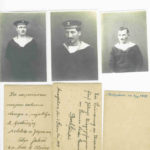


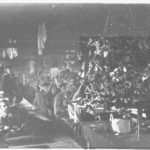
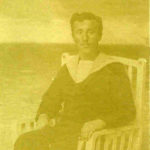


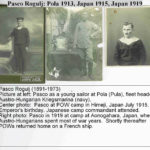


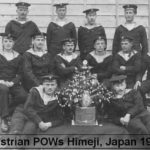





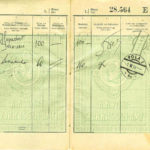




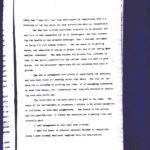
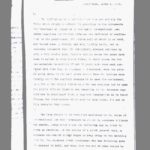
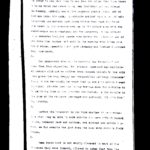
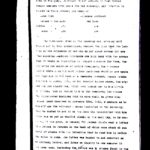
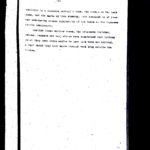

Login to leave a note